
No. 7, 2023 | 7 July 2023
Go to:
From FRSA's Executive Director
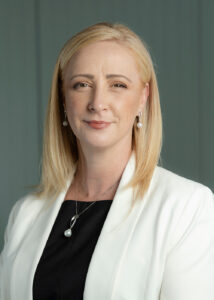
Happy NAIDOC WEEK!
I come to you from the lands of the Ngunnawal and Ngambri peoples and I pay my respects to their Elders past and present and emerging leaders of the future. I also pay my respects to all Aboriginal and Torres Strait Islander people who might be reading this e-bulletin.
As adult, voting citizens we will be asked, before the year is out, to Vote ‘yes’ or to vote ‘no’ to alter the Australian Constitution to “recognise First People of Australia by establishing an Aboriginal and Torres Strait Islander Voice to make representations to the Parliament and the Executive Government of the Commonwealth on matters relating to Aboriginal and Torres Strait Islander peoples”. This historic legislation was finally passed on 19 June and sets in motion the referendum process.
If you missed it, the Hon Linda Burney, Minister for Indigenous Australians, addressed the National Press Club on Wednesday this week strong in her commitment, and that of her party, to seeing the Constitutional recognition of an Aboriginal Voice is a success.
Yesterday, I was involved in an ACOSS CEO online forum with the amazing Professor Megan Davis as special guest. Megan is a Cobble Cobble woman of the Barunggam Nation and a renowned constitutional lawyer and public law expert focusing on advocacy for Aboriginal and Torres Strait Islander peoples. She is a key advocate in the Voice conversation and was instrumental in building the vision for and bringing to life the Uluru Statement of the Heart. There is so much that Megan says that makes you sit up and listen but there was an especially pertinent point she stressed during the conversation – when you strip away all the politics around the Voice to Parliament debate – it is at the heart of it asking whether ‘you’ think that first nations people should have a say in the decisions made that impact on them. She also reminded us that underpinning the Referendum is the Uluru Statement of the Heart. It is great to be reminded of the strength and richness of that Statement. I know that I have shared it before in this forum but given it is NAIDOC week – I do so again and strongly encourage you to read it and hear the bold messages of reconciliation and engagement in that statement.
Even four years after it was published the Uluru Statement won the Sydney Peace prize (in 2021) with judges describing the Statement as “the powerful and historic offering of peace’ which ‘offers a clear agenda for healing in Australia’.
Kind regards,
Jackie Brady
FRSA Executive Director
Strategic Leadership Forum 2023
FRSA is excited to convene this year’s Strategic Leadership Forum (SLF) event in Canberra on 12-13 September 2023. The event brings together CEOs and senior executives from FRSA’s Membership and this year’s theme is Knowing our value – Affirming our place.
Registration for the event is now open, click the button below to access the registration website. This is an FRSA Members only event.
Stay tuned for more details on the event including the program, speakers, accommodation and more. Make sure you receive the latest information about SLF 2023 by subscribing to the mailing list on the SLF webpage.
If you have any questions, please contact the National Office on (02) 6162 1811 or email our Events and Membership Officer, Narelle at events@frsa.org.au.
FRSA Webinar: Findings of the landmark Australian Child-Maltreatment Study
On 15 June, FRSA hosted a member-only webinar on the findings of the landmark Australian Child-Maltreatment Study.
Lead investigator on the study, Professor Ben Mathews from the School of Law at Queensland University of Technology, presented the findings and the research team’s key recommendations for preventing child maltreatment in the future. We see an important role for our sector in this endeavour.
The Australian Child Maltreatment Study is the first Australian survey to identify the national prevalence of all five forms of child maltreatment – physical abuse, sexual abuse, emotional abuse, neglect, and exposure to domestic violence – and their associated mental health disorders, health risk behaviours, physical health conditions, and burden of disease. The findings of this study are deeply concerning. Child maltreatment is widespread in Australia and associated with early and persistent harm.
The Australian Child-Maltreatment Study website hosts a range of useful information and resources as well as the study report.
FRSA Members can log into the Members Only page on the FRSA website to watch the webinar on demand or to get a copy of the presentation slides. Please contact us at contact@frsa.org.au if you require the Member Password or would like the slides or recording links emailed to you.
Coercive control literature review: final report
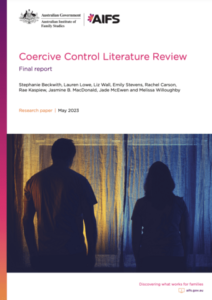 Australian Institute of Family Studies has released a literature review on coercive control in the context of domestic and family violence, with a particular focus on the understanding of, and responses to coercive control in the Australian context.
Australian Institute of Family Studies has released a literature review on coercive control in the context of domestic and family violence, with a particular focus on the understanding of, and responses to coercive control in the Australian context.
The report was commissioned by the Australian Attorney-General’s Department, and the review focuses on identifying, summarising, analysing and synthesising the existing Australian academic research and evaluations on coercive control. The review highlights the complexities of defining, recognising, and responding to coercive control and identifies relevant gaps in the evidence base.
Drawing from a range of quantitative and qualitative studies across scholarly and grey literature, including non-government reports, government and parliamentary reports, peak body reports, and position papers, this review captures the growing recognition of coercively controlling behaviour in the context of family and domestic violence.
New Australian Electoral Commission requirements for charities
A referendum disclosure scheme has been introduced through changes to the Commonwealth Referendum (Machinery Provisions) Act 1984.
The changes to the Act will only affect your charity if it is campaigning, receiving donations or making donations on referendum matters and the amount is $15,200 or more. This will apply to the upcoming referendum on an Indigenous Voice to Parliament. Referendum matters are matters communicated to influence the way people vote in a referendum.
The Australian Electoral Commission oversees this change, and has published guidance on its website about the referendum disclosure scheme.
Charity governing bodies and their Responsible People should take care to comply with Australian electoral laws, and should refer to the AEC’s guidance if they expect to spend $15,200 or more on referendum matters.
King's birthday honours
 The King’s Birthday Honours were announced earlier this week with a number of connections to the FRSA Membership. Sincere congratulations to:
The King’s Birthday Honours were announced earlier this week with a number of connections to the FRSA Membership. Sincere congratulations to:
- CEO of Relationship Matters, Maya Avdibegovic who was made a member of the Order of Australia (AM) for service to the community through social welfare organisations.
- ACOSS CEO, Dr Cassandra Goldie who was appointed an Officer of the Order of Australia (AO) for her distinguished service to social justice through leadership and advocacy to promote the rights of people marginalised and disadvantaged in the community
- CEO of Jesuit Social Services, Dr Julie Edwards who received a Medal of the Order of Australia (OAM) for her service to the community through social welfare organisations.
- Longtime OzChild foster carer, Joan Graham who received a Medal of the Order of Australia (OAM) for her for service to children as a foster carer.
FRSA National Conference 2023 Presentation slides now available
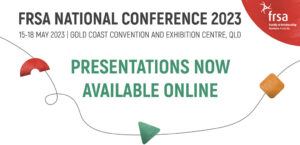 The FRSA Conference, held on the Gold Coast in May, showcased the great richness and diversity of the sector with over 65 concurrent session presentations and five symposiums. With permission of the presenters, we have made as many presentation slides as possible available via the FRSA Conference page . To access these presentations simply open or download the PDF version of the program and click on the session you are interested in.
The FRSA Conference, held on the Gold Coast in May, showcased the great richness and diversity of the sector with over 65 concurrent session presentations and five symposiums. With permission of the presenters, we have made as many presentation slides as possible available via the FRSA Conference page . To access these presentations simply open or download the PDF version of the program and click on the session you are interested in.
Stay tuned for the recordings of the keynote presentations and panel discussion, which will be uploaded to FRSA’s YouTube channel in the coming weeks.

Continuing Communities of Practice
FRSA is pleased to announce that we will be continuing to deliver Communities of Practice (CoP) discussions in 2023-24 and there are spaces for more participants!
Program managers and senior practitioners from providers of the five programs below, which are funded under the Department’s ‘Families and Children’ Activity, can express their interest in joining our online Community of Practice (CoP) discussions:
- Family & Relationship Services (FaRS)
- Specialised Family Violence Services (SFVS)
- Family Mental Health Support Services (FMHSS)
- Child & Parenting Services (CaPS)/Budget Based Funded (BBF)
- Communities for Children Facilitating Partners (CfC FP)
We particularly encourage people from smaller organisations and programs and organisations in rural/remote areas to express their interest.
CoP discussions for each program areas will run every 6-8 weeks and will focus on program-wide or systems practice issues rather than therapeutic or support issues arising in the practitioner-client relationship.
For more information about how the CoPs work and what they will look like in 2023-24, read our information sheet.
We will be opening an Expression of Interest process in the next few days which we will be distributing throughout the Family and Relationship Services sector – through our member contacts and with the assistance of DSS and AIFS.
These CoP sessions are delivered with the support of the Australian Institute of Family Studies and funded by the Department of Social Services.
If you have any questions about the CoPs please contact the CoPs Project Officer, Sandra Rabjohns on 02 6162 1811 or projects@frsa.org.au
Highlights from the last financial year
Over the last twelve months the Family and Relationship Services sector has once again shown its capacity to be agile, resilient, and responsive as it continued to work with children, families and communities throughout Australia. FRSA has also worked to support the membership in its work by delivering strong messages to government and other stakeholders that reflect the experiences, views and interests of our membership and help to shape decision-making.
Highlights for the 2022-2023 include:
- The FRSA National Conference held 15-18 May 2023 – with a record 550 delegates in attendance;
- FRSA’s step up to an “Innovate” Reconciliation Action Plan released March 2023;
- The launch of the FRSA Strategic Plan 2023-2027 in November 2022;
- The Strategic Leadership Forum (SLF) 2022 held in Canberra, 23-24 November 2022;
- Continuing our support to the FRS sector through the delivery of the Communities of Practice (COPs) for DSS funded Families and Children Activity Program;
- Engagement in Inquiry and Submission processes including:
- DSS’ consultation on The Early Years Strategy (April 2023).
- AGD’s consultations on potential improvements to the family law system Family Law Amendment Bill 2023 (February 2023).
- the House Select Committee on Workforce Australia Employment Services inquiry into ParentsNext (November 2022).
- the Inquiry on the Aboriginal and Torres Strait Islander Voice Referendum (April 2023).
- Three submissions to the Treasury on the Remake of ACNC Regulations (August 2022), FRSA’s Pre-Budget Submission – 2023-2024 (January 2023) and Measuring What Matters – The Treasury Consultation Phase (May 2023).
FRSA Members Only Webinar: The National Centre for Action on Child Sexual Abuse: Who we are and how we’re responding to professional development needs
Following our recent FRSA Webinar on the findings of the landmark Australian Child-Maltreatment Study, FRSA is hosting this Members Only webinar. All staff in our Member Organisations are able to register.
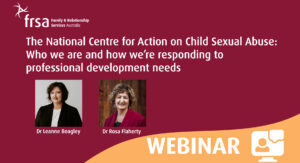
Webinar: The National Centre for Action on Child Sexual Abuse: Who we are and how we’re responding to professional development needs
Thursday, 27 July 2023 | 11:30am-12:30pm (AEST)
The Australian Child Maltreatment Study (2023) found that across Australia, one in three girls and one in five boys have experienced some form of child sexual abuse before the age of 15.
Dr Leanne Beagley and Dr Rosa Flaherty from the National Centre for Action on Child Sexual Abuse will present on the important work of the National Centre to raise awareness and understanding of child sexual abuse, support help-seeking and guide best practice.
A key platform of the National Centre’s work is to build the capability of workforces to protect children from harm and respond to victims and survivors of child sexual abuse. Leanne and Rosa will talk about the findings of a survey the National Centre recently conducted to understand the learning and development needs of a broad range of workers who have responsibility for protecting and supporting children, young people and adults who have experienced child sexual abuse.
Join this webinar to learn more about how the National Centre can support you in this important area of work.

Multicultural Framework Review
The Government has announced the commencement of the Multicultural Framework Review, delivering on an election commitment to examine the function and framework of Australia’s multicultural policies.
The Review coincides with the 50th anniversary of the Whitlam Government’s 1973 report ‘A Multi-cultural Society for the Future’, which marked the birth of contemporary multicultural Australia.
Drawing on the knowledge of culturally and linguistically diverse communities from around Australia, the Review will assess what Commonwealth multicultural policy could look like.
A Reference Group to support the panel will include eminent Australians from diverse backgrounds, as well as representatives from key non-government stakeholders. A full list of Reference Group members can be found here.
The Review is expected to deliver its final report with recommendations to the Minister for Immigration, Citizenship, and Multicultural Affairs by March 2024.
Release of the 9th edition Australian Charities Report
On 22 June 2023, the Australian Charities and Not-for-profits Commission (ACNC) released the 9th edition of the Australian Charities Report. This edition is based on information submitted in the 2021 Annual Information Statements (AIS) of 49,402 charities.
The data shows Australia’s charity sector generated $190 billion in revenue and employed 10.5 % of the workforce, highlighting its significance to the Australian economy and community.
Other Report headlines include:
- Donations increased by $676 million to $13.4 billion, and charities reported more than $422 billion in assets, an increase of nearly $31 billion.
- However, expenses also went up by $7.1 billion to almost $175 billion. Liabilities rose by $4.1 billion to $141.7 billion, with a 40% increase over three years.
- There has been a decline in volunteering, dropping from 3.4 million to 3.2 million. Despite this, volunteers continue to underpin the work of the sector and 50% of charities operate with no paid staff.
Information about the report and a copy of the report are available on the ACNC website.
Family Law Amendment Bill 2023
The Senate Legal and Constitutional Affairs Committee is currently inquiring into the Family Law Amendment Bill 2023.
On 13 June, Rebecca Mills, A/g Assistant Secretary, Family Law Branch in the Attorney-General’s Department provided a FRSA Members-only webinar update on the Bill. Rebecca provided an overview of amendments that were made to the Bill to incorporate feedback following consultations on the exposure draft, prior to its introduction in the parliament. If passed, the reforms will make a number of changes to the parenting and children framework in the Family Law Act, with implications for the work of family law service providers. If you are an FRSA member and weren’t able to attend the webinar, you can get a copy of the presentation slides and webinar recording by contacting FRSA Manager Policy and Research, Robyn Clough – policy@frsa.org.au
The Committee is due to report by 24 August 2023. Information about the inquiry, including the draft Bill and explanatory memorandum, is available on the Committee’s webpage.
‘You win some, you lose more’ - report on online gambling inquiry tabled
On 28 June 2023, the House of Representatives Standing Committee on Social Policy and Legal Affairs tabled the report of its inquiry into online gambling and its impacts on those experiencing gambling harm.
The report provides 31 recommendations that apply a public health lens to online gambling to reduce harm to Australians. This includes the Australian Government developing and implementing a comprehensive national strategy on online gambling harm reduction, supported by national regulation, an online gambling ombudsman, a harm reduction levy on online wagering service providers (WSPs), a public education campaign, more independent research and improved data collection.
The report, You win some, you lose more, and information about the inquiry is available on the inquiry website.
Inquiry into Commonwealth grants administration
On 29 June, the Joint Committee of Public Accounts and Audit released a report on its inquiry into Commonwealth grants administration.
The inquiry received 24 submissions and 25 supplementary submissions (18 of which contained responses to questions provided in writing by the Committee or taken on notice at public hearings). Four public hearings for the inquiry were conducted in Canberra.
The committee made eight recommendations, which it says are aimed at strengthening the Commonwealth grants administration processes. Recommendation 3 asked that the Australian Government amends the Commonwealth Grants Rules and Guidelines 2017 to provide that:
- Competitive, merit-based processes should be the default,
- Program guidelines must disclose the roles of stakeholders, including Parliamentarians,
- Decision-makers cannot choose from a pool of recommendations,
- Explicit reference is made to the Department of Finance’s guide on Government grants,
- Funding approvals against agency recommendations must be recorded and reported to the Minister for Finance, and
- ‘Other factors’ by which grants will be assessed should be fully transparent and appropriately evaluated and scored.
Other recommendations included:
- The implementation of an additional principle in the Commonwealth Grants Rules and Guidelines (CGRG) that decision-makers must adhere to these guidelines.
- Clarification of how an election commitment is defined in the Department of Finance guide on Government grants.
- Best practice templates and checklists be developed by the Department of Finance to ensure consistent and comprehensive documentation throughout the grant process.
- A future ANAO audit of the process so the Finance Minister is informed of grant approvals against the recommendation of the awarding agency.

World Elder Abuse Awareness Day
It was World Elder Abuse Awareness Day (WEAAD) on 15 June. The day aims to bring together individuals, communities, and organisations to raise awareness to the growing issue of elder abuse.
Elder abuse is any act which causes harm to an older person and is carried out by someone they know and trust such as a family member or friend. The abuse may be physical, social, financial, psychological or sexual and can include mistreatment and neglect.
See how FRSA Members commemorated the day:
- Relationships Australia Tasmania staff joined the Walk Against Elder Abuse to help raise awareness.
- UnitingCare QLD’s Elder Abuse Prevention Unit team co-hosted the “It’s all about Respect” community event at South Bank Parklands to help to educate the community on elder abuse.
- Relationships Australia Canberra & Region staff attended the Elder Abuse Services collaboration workshop, coordinated by the Attorney-General’s Department and the Department of Social Services Community Grants Hub. They also provided an information session to Bungendore and District Lions on the topic of elder abuse and the formation of the Queanbeyan Palerang Elder Abuse Collaborative.
- Anglicare Tasmania shared an article on how to recognise the subtle warning signs of elder abuse.
- Relationships Australia Queensland shared infographics on protective factors for elder abuse and signs of elder abuse.
- Residents and staff across Anglicare SA’s Residential Aged Care got together to recognise the day.
- Mercy Community shared what signs to look out for if elderly person you know might be experiencing abuse.
- Relationships Australia WA shared that the Mandurah Bridge was lit up purple to commemorate World Elder Abuse Awareness Day.
- Relationships Australia NSW shared information on how to spot the warning signs of elder abuse.
- Uniting shared a video reminding people of the importance of recognising WEAAD, watch it below:
Refugee Week 2023
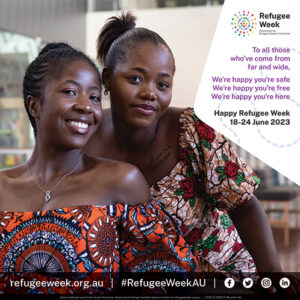 It was Refugee Week from 18-24 June 2023. Refugee Week is Australia’s peak annual activity to inform the public about refugees and celebrate positive contributions made by refugees to Australian society. Refugee Week provides a platform where positive images of refugees can be promoted in order to create a culture of welcome throughout the country. This year’s theme is Finding Freedom.
It was Refugee Week from 18-24 June 2023. Refugee Week is Australia’s peak annual activity to inform the public about refugees and celebrate positive contributions made by refugees to Australian society. Refugee Week provides a platform where positive images of refugees can be promoted in order to create a culture of welcome throughout the country. This year’s theme is Finding Freedom.
The theme asks what does it mean to be free? To live without the fear of war, to have your basic human rights upheld, to live in equality and without the fear of persecution are just some of the examples of what freedom can entail. Every day millions of people across the world embark on dangerous journeys for the sole purpose of finding safety and freedom. From Australia to nations across the globe, settling into a new environment after experiencing the perils of a refugee’s journey can also provide the opportunity to live, to love and to dream.
See how FRSA members commemorated the week:
- CatholicCare Tasmania’s Multicultural Programs held two events during the week which educated staff about who refugees are and why they have come to Australia, and to celebrate the contribution refugees make to our communities.
- Cafs shared their CALD Action Plan, which outlines the strategies and actions that Cafs will undertake over the next 2 years to eliminate discrimination and improve access, equity, inclusion and participation for CALD people within the organisation, our service users, volunteers and the broader community.
- Centacare Catholic Family Services shared Erfanullah’s story of fleeing Kabul as Afghanistan fell to the Taliban and arrived in Adelaide in September 2021. He shared his story to help the broader community understand what it is like to be a refugee and how it feels to embark on a dangerous journey to find safety and freedom.
- CatholicCare Hunter-Manning shared a video about their Refugee Hub and the stories of adversity and inspiration that their clients have shared experienced.
- Anglicare SA shared the story of Gatluit, a settlement coach in AnglicareSA’s Settlement Engagement and Transition Support program and his efforts to help other refugees achieve in his role.
- Centacare South West NSW shared stories from their Settlement, Engagement and Transition Support (SETS) team.
- EACH spoke to one of their Refugee Health Nurses, Man Lian, to learn more about the significant work Refugee Health Nurses do in the community.
- Centacare NENW shared a video about refugee myths and facts.
Marymead and CatholicCare Canberra merge to become Marymead CatholicCare Canberra & Goulburn
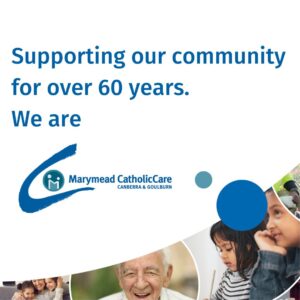 In July 2021, the Catholic Archdiocese of Canberra and Goulburn announced the merger of Marymead Child and Family Centre and CatholicCare Canberra & Goulburn to form a single entity, Marymead CatholicCare Canberra & Goulburn (MCCG), which they have begun operating as from last week.
In July 2021, the Catholic Archdiocese of Canberra and Goulburn announced the merger of Marymead Child and Family Centre and CatholicCare Canberra & Goulburn to form a single entity, Marymead CatholicCare Canberra & Goulburn (MCCG), which they have begun operating as from last week.
“This is a huge milestone day for us,” said CEO, Anne Kirwan. “We begin a new chapter in our caring journey, and we are incredibly proud that our foundations hold the stories of courageous, passionate, hard-working, committed women and men who rolled up their sleeves to provide essential services and spiritual support during critical periods in the lives of others.”
Both Marymead and CatholicCare have been operating in the Canberra region as separate agencies delivering community services to the region with a collective history of more than 119 years. With a shared commitment to making a difference, the coming together of the two organisations will provide a wider range of services to reach more people in need while providing a stronger and more unified voice for individuals and families in the community.
MCCG operates across both the ACT and regional New South Wales areas employing over 600 staff – the footprint extends across Canberra, into Queanbeyan, Goulburn, Young, Wagga, the South Coast and down through the snowy region.

NAIDOC Week
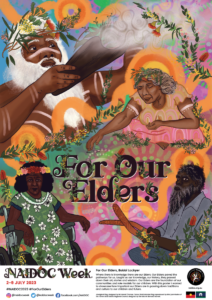 This year’s NAIDOC Week will be held from Sunday 2 July to Sunday 9 July 2023. The week is an opportunity for all Australians to come together to celebrate the rich history, diverse cultures and achievements of Aboriginal and Torres Strait Islander peoples as the oldest continuing cultures on the planet.
This year’s NAIDOC Week will be held from Sunday 2 July to Sunday 9 July 2023. The week is an opportunity for all Australians to come together to celebrate the rich history, diverse cultures and achievements of Aboriginal and Torres Strait Islander peoples as the oldest continuing cultures on the planet.
This year’s theme is For Our Elders. Across every generation, First Nations Elders have played, and continue to play, an important role and hold a prominent place in our communities and families. The theme encourages us to pay homage and respects to the First Nations Elders who have passed and those who are continuing to fight fighting for First Nations people.
For more information on how to get involved and resources available, visit the NAIDOC website.
Webinar: A child and family services’ guide to The Longitudinal Study of Australian Children (LSAC)
Australian Institute of Family Studies are holding a webinar, A child and family services’ guide to The Longitudinal Study of Australian Children (LSAC) on Friday, 28 July 2023 at 1:00PM – 1:30PM (AEST).
In this webinar, Dr Lisa Mundy, the AIFS Program Lead of the study, will share some insights for child and family services and practitioners on how they can best use the research from the Growing Up in Australia: The Longitudinal Study of Australian Children (LSAC).
This webinar is recommended for child and family service program managers and practitioners who work with children, young people and families in a range of settings. The content may be of particular interest to those working in areas relating to child and adolescent development, with carers and parents, or in areas related to mental health and wellness.
National Mental Health Commission Youth Digital Survey
 Applications for the 2024 Young Carer Bursary round are opening soon on 18 July and close on 12 September 2023. The Young Carer Bursary Program offers financial assistance to carers aged 12 to 25 to help with educational needs and resources and reduce their need to undertake paid work at the same time as their study and caring duties. The program offers 1592 bursaries of $3768 each year to assist with education needs and resources. Click here to find out more or to apply.
Applications for the 2024 Young Carer Bursary round are opening soon on 18 July and close on 12 September 2023. The Young Carer Bursary Program offers financial assistance to carers aged 12 to 25 to help with educational needs and resources and reduce their need to undertake paid work at the same time as their study and caring duties. The program offers 1592 bursaries of $3768 each year to assist with education needs and resources. Click here to find out more or to apply.
2023 Mental Health Research Grant Opportunity
The Medical Research Future Fund (MRFF) Million Minds Mental Health Research Mission aims to improve the quality of life of an additional one million people, who might not otherwise benefit from mental health research, to be part of new approaches to prevention, detection, diagnosis, treatment and recovery.
This grant opportunity will support research and medical innovation projects that:
Description:
The Medical Research Future Fund (MRFF) Million Minds Mental Health Research Mission aims to improve the quality of life of an additional one million people, who might not otherwise benefit from mental health research, to be part of new approaches to prevention, detection, diagnosis, treatment and recovery.
This grant opportunity will support research and medical innovation projects that:
- Stream 1 (Targeted Call for Research): conduct a large-scale multidisciplinary project in partnership with priority population groups, to identify structural inequalities as well as individual mental health challenges leading to poor mental health, and then develop collective strategies to improve the mental health of these communities.
- Stream 2 (Incubator): conduct small-scale developmental projects to improve the understanding of the ways to safeguard the mental wellbeing of communities and individuals affected by:
- Topic A: environmental threats (such as bushfires, floods, effects of climate change and others).
- Topic B: the COVID-19 pandemic including long COVID.
- Stream 3 (Targeted Call for Research): conduct a large-scale multidisciplinary project to build knowledge of the factors that protect the mental wellbeing of individuals and communities from environmental threats and/or the COVID-19 pandemic, how these vary between communities, and how to foster these in communities through community-based leadership.
- Stream 4 (Incubator): conduct small-scale developmental projects to improve capability in, and develop new models of care for, rural and remote settings or other under-researched settings.
Applicants to this grant opportunity must propose research that addresses one of the four Streams of research. Applications close 29 November 2023 at 5pm (AEST). Click here to find out more.
Effective Online Group Leadership Workshop
SUNSHINE CIRCLES – Albury
SUNSHINE CIRCLES – Shepparton
HEY LITTLE WARRIOR – Sale
QLD
Child and Youth Counsellor – First Nations program | Relationships Australia QLD
NT
Lead Practitioner – Counselling Services – Darwin, NT | CatholicCare NT
VIC
Senior Kids in Focus Case Manager | Odyssey House Victoria
If you have any events you’d like listed on the FRSA Events and Training Calendar or job vacancies you’d like listed on the FRSA Jobs Board, email Communications Officer, Vanessa Lam at communications@frsa.org.au. Please note that posting onto the FRSA website is reserved for FRSA Members only.

The Australian Inequality Index: summary report – May 2023 | Per Capita
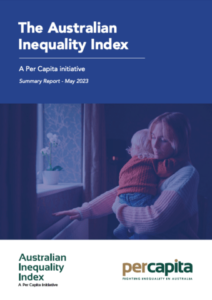 The Australian Inequality Index is a tool by which we can measure the various aspects of inequality across Australian society, interrogate its causes, and inform the necessary government and community-led interventions to reduce it. This summary report provides information about the creation of this online tool.
The Australian Inequality Index is a tool by which we can measure the various aspects of inequality across Australian society, interrogate its causes, and inform the necessary government and community-led interventions to reduce it. This summary report provides information about the creation of this online tool.
Understanding the social impact of safeguarding services for children and young people | University of Western Australia
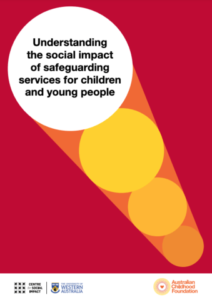 Safeguarding Services is a suite of support services offered to organisations who deliver services to children and young people. The Centre for Social Impact at the University at the Western Australia was engaged by the Australian Childhood Foundation to examine and document the social impact story of Safeguarding Services. This report outlines the findings.
Safeguarding Services is a suite of support services offered to organisations who deliver services to children and young people. The Centre for Social Impact at the University at the Western Australia was engaged by the Australian Childhood Foundation to examine and document the social impact story of Safeguarding Services. This report outlines the findings.
Employment patterns and trends for families with children | Australian Institute of Family Studies
This research paper explores the work patterns of parents as they balance the responsibilities of raising children with the demands of employment at the family level as well as separately for mothers and fathers.
Improving police risk assessment of domestic violence: a follow-up validation study | Australian Institute of Criminology
This study examines the predictive validity of ACT Policing’s refined Family Violence Risk Assessment Tool, which exhibited a good overall level of accuracy in predicting repeat domestic violence within the sample that was used to develop it.
Care in context: Australian perspectives on caregiving and care work during COVID-19 | Australian National University
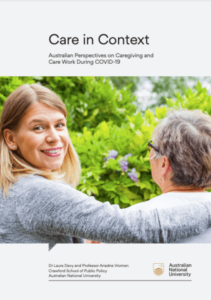 This report presents new data from a survey about Australian experiences and attitudes towards caring and care work.
This report presents new data from a survey about Australian experiences and attitudes towards caring and care work.
Involving children in evaluation | Australian Institute of Family Studies
This practice guide outlines the reasons to involve children in program evaluation and includes some practical considerations and approaches to collecting data from children
Best interests: listening to children and young people’s experiences within the child protection system | Commissioner for Children and Young People (SA)
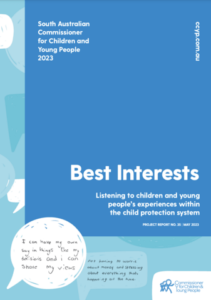 This report examines the experiences of South Australian children and young people who have had contact with the state’s child protection system and what they say needs to be done to improve it.
This report examines the experiences of South Australian children and young people who have had contact with the state’s child protection system and what they say needs to be done to improve it.
The effect of school closures on standardized test scores: evidence from Australia | Tax and Transfer Policy Institute
Australian states and territories independently implemented school closures as part of Australia’s successful COVID-19 elimination strategy. In this paper, the authors estimate the causal effect of pandemic school closures on standardised test scores in Australia, using variation in the length of school closures.
Exposure to intimate partner violence and the physical and emotional abuse of children: results from a national survey of female carers | Australian Institute of Criminology
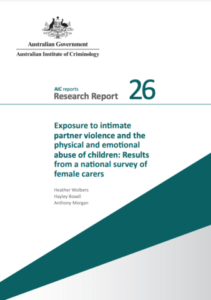 This study addresses a crucial gap in the evidence by focusing on children as victims of violence and abuse in their own right, concentrating on two facets of child abuse – exposure to IPV perpetrated against their female carers, and being the direct target of physical and/or emotional abuse.
This study addresses a crucial gap in the evidence by focusing on children as victims of violence and abuse in their own right, concentrating on two facets of child abuse – exposure to IPV perpetrated against their female carers, and being the direct target of physical and/or emotional abuse.
Key organisations for working with culturally and linguistically diverse families | Australian Institute of Family Studies
This resource sheet is a directory of key organisations and resources for practitioners and service providers working with families and children from culturally and linguistically diverse (CALD) backgrounds.
Prosocial behaviours and the positive impact on mental health | The Longitudinal Study of Australian Children
Prosocial behaviours are any activities that have the aims of benefiting others or society. These behaviours can include volunteering, contributing to others’ wellbeing through acts of kindness, or helping those who are less fortunate.
Supporting safer digital spaces | Centre for International Governance Innovation
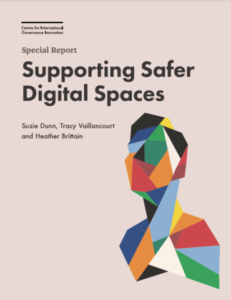 The objective of this research was to create policy and legal recommendations to better protect vulnerable and marginalised populations, in particular women and LGBTQ+ people, from identity-based online harms.
The objective of this research was to create policy and legal recommendations to better protect vulnerable and marginalised populations, in particular women and LGBTQ+ people, from identity-based online harms.
Want to submit something to the FRSA eBulletin?
If you have an news item or event that you would like to be featured in a future eBulletin please submit your announcement via the form below or email communications@frsa.org.au with the subject “FRSA eBulletin submission”.
Please note FRSA members receive priority for items posted in the eBulletin. And to keep information current, relevant and useful, submissions will not be repeated from week to week.
Subscribe
Subscribe to receive future eBulletin editions directly to your inbox!








